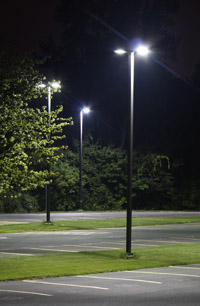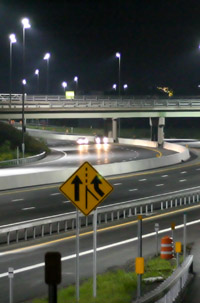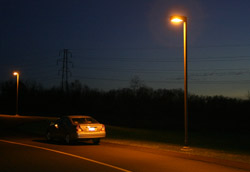Dates for the next Institutes to be determined.
 The Outdoor Lighting Institute provides engineers, lighting designers, municipal officials, utility personnel and others with the knowledge and tools that they need to develop outdoor lighting installations that substantially reduce energy use and light pollution while improving safety and security.
The Outdoor Lighting Institute provides engineers, lighting designers, municipal officials, utility personnel and others with the knowledge and tools that they need to develop outdoor lighting installations that substantially reduce energy use and light pollution while improving safety and security.
In the past few years, outdoor lighting design and specification has become much more complex, with many variables to be considered including human vision, technology, light pollution, glare, curfews, control systems, guidelines and recommended practices, and other factors that go into developing an effective, and energy-efficient lighting installation. While outdoor lighting design, specification, and equipment selection has often been done by municipal traffic engineers, more and more this is becoming a specialized field that creates opportunities for new business growth among engineers and other professionals who wish to specialize in this area of lighting.
To meet this need, the LRC has developed The Outdoor Lighting Institute. This hands-on, practical course teaches engineers, lighting designers, and other personnel how to effectively design, specify, and commission energy-efficient outdoor lighting installations for a variety of sites and locations including streets and roadways, parking areas, parks, pedestrian areas, and other locations.
Course Goal
The goal of the training program is to provide a variety of professionals with the knowledge and tools needed to develop outdoor lighting installations that substantially reduce energy use and light pollution while improving safety and security.
 At the completion of this course, attendees will:
At the completion of this course, attendees will:
- Understand the human nighttime visual system and know how to apply this knowledge in the design of outdoor lighting installations and the selection of light source technologies.
- Understand the possible human health implication of nighttime light exposure.
- Understand the principles of light pollution (i.e., skyglow, light trespass, and glare); know how to evaluate a design to ascertain its contribution to each of these factors, and know how to take steps to mitigate these factors during the design process.
- Understand the lighting factors that contribute to nighttime safety, security, crime reduction, and economic development and be able to apply this knowledge in the design of outdoor lighting installations for a variety of site types.
- Be aware of the various computer software programs used in outdoor lighting design, understand and be able to evaluate the output of each program, and select the program that will best work for them.
- Be aware of new technologies (e.g., LEDs, advanced control systems) and design practices (e.g., curfews, mesopic vision) in the field of outdoor lighting and know how to effectively apply these to outdoor lighting design.
- Be able to evaluate various lighting technologies used for outdoor lighting and select the technology and equipment that will provide the most effective and efficient solution for a particular site or location.
- Be able to use various guidelines and recommended practices in the design of an outdoor lighting installation.
- Be able to evaluate an existing outdoor lighting installation for effectiveness, safety, and efficiency, and develop recommendations for improvements where needed.
Course Outline
Review the course schedule for a previous Institute.
![]()
The course is held at the LRC facilities in Troy, NY, over a two-day period. It includes lectures, hands-on sessions, and field exercises to cover the various knowledge and tools needed to effectively design, specify, and select equipment for outdoor lighting installations. The course includes a nighttime field session in which the attendees evaluate several outdoor lighting installations in the Capital District area. Sessions address each of the objectives listed above, including working with computer software and developing actual lighting designs and specifications for a variety of sites. Topics covered during the course include:
 Terminology and measures used in outdoor lighting
Terminology and measures used in outdoor lighting- Human vision at nighttime light levels and how this effects outdoor lighting design and equipment selection
- Light pollution, its measurement and mitigation
- Lighting technologies used in outdoor lighting including lamps, ballasts, luminaires, and control systems and how to evaluate these technologies for effectiveness, efficiency, light distribution, economic viability, and other factors
- Computer software used in outdoor lighting design and evaluation
- The role of outdoor lighting in improving nighttime safety and security, preventing traffic accidents, reducing crime, and improving community economic development
- Outdoor lighting design, using guidelines and recommended practices, including practical sessions on outdoor lighting design
- Outdoor lighting evaluation and field measurement
Request more information from Daniel Frering, Director of Educational Programs
About the Instructors
Instructors for The Outdoor Lighting Institute will include a number of LRC faculty and staff:
Jennifer Brons, LC — A senior scientist at the LRC, Professor Brons has conducted numerous evaluations of outdoor lighting installations. One of her main areas of research includes the development of an evaluation tool to accurately quantify the impacts of outdoor lighting designs and installations on light pollution.
John Bullough, PhD — Professor Bullough heads the transportation and outdoor lighting program at the LRC. He is an expert in transportation and roadway lighting and conducts research in wide range of areas related to outdoor lighting including the development of guidelines for outdoor and roadway lighting; quantification of glare from automotive headlamps and outdoor lighting installation; development and evaluation of improved roadway lighting systems and technologies; and human vision at nighttime light levels.
Daniel Frering, LC — The director of educational programs at the LRC teaches courses and seminars in lighting technology, daylighting, control systems, lighting applications, and economic analysis. His current research includes the evaluation of daylighting technologies, photovoltaic outdoor lighting systems, and energy-efficient lighting.
Jean Paul Freyssinier, LC —A senior scientist at the LRC and adjunct assistant professor, Jean Paul Freyssinier is an expert in solid-state lighting systems and leads research in new luminaire design and development; lighting applications; and technology evaluation and testing. Professor Freyssinier also works in the area of human factors and light and color.
Russ Leslie, AIA — Professor and Associate Director of the LRC, Russ Leslie is the co-author of The Outdoor Lighting Pattern Book. Professor Leslie has performed research and completed design work in the area of outdoor lighting throughout his more than 30-year career in lighting.
N. Narendran, PhD — A professor and the Director of Research for the LRC, Dr. Narendran is well known throughout the lighting industry for his pioneering research and educational activities in the field of solid-state lighting. Dr. Narendran leads a team of researchers and educators in the area of solid-state lighting at the LRC and conducts research and educational programs to accelerate the development and market transformation of this promising technology.
Leora Radetsky — A research scientist at the LRC, Ms. Radetsky has conducted research in a range areas related to outdoor lighting including modeling and evaluation of outdoor lighting designs and the evaluation of outdoor lighting technologies and systems. Ms. Radetsky is also a member of the IES roadway lighting committee and the roadway standard practice subcommittee.
Mark S. Rea, PhD — A professor and Director of the LRC, Dr. Rea is an expert in human vision and has conducted groundbreaking research in the area of nighttime vision including the development of a unified system of photometry which more accurately quantifies the visual efficacies of outdoor lighting technologies. Dr. Rea has also led research into the evaluation of the impact of lighting on roadway safety and accident prevention, and the impact of outdoor lighting on safety and security.
Sponsors
The Outdoor Lighting Institute is made possible by the support of these sponsors:
 |
 |


